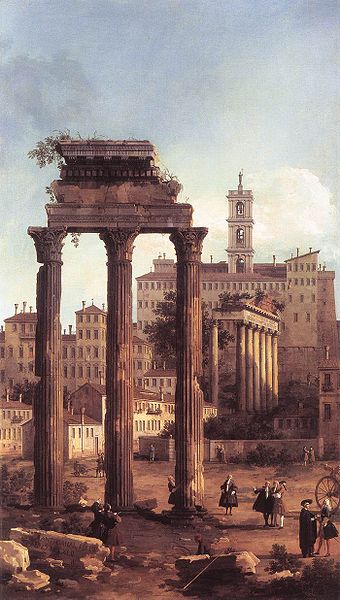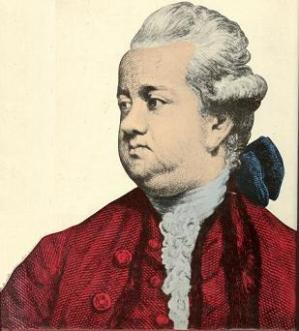On the 15th October 1764, Edward Gibbon observed a group of friars singing in the ruins of the Temple of Jupiter in Rome, which inspired him to commence work on ‘The History of the Decline and Fall of the Roman Empire’.
Edward Gibbon, as a writer and historian has so much to tell us about Roman history and all its intricate little stories and side events that fill the lines of his pages. If you manage to pick up a good abridged version of his ‘History of the Decline and Fall of the Roman Empire’ you will definitely be in for a treat. (I think I would have to draw breath first if I were to tackle his full 6 volume version, at some 1,500,000 words !)
Overall it is hailed as a masterpiece because of it relative objectivity and heavy use of primary sources. Though, there is also much in it that offends and draws criticism from scholars and modern historians. In particular, his scathing views of Christianity and his neglect to fully focus on the later history of the empire (Byzantium). Nevertheless, he is often referred as the first ‘modern historian of ancient Rome’.
Though lets not turn this article in an analysis of his work, but more of a ‘celebration’ that he had the foresight or vision to write it. Perhaps also we could momentarily talk about the man himself. Born on May 8th 1737, he struggled in his early years with bad health. He famously described himself as “a puny child, neglected by my mother, starved by my nurse.” With his health improving by his teens, Gibbon was sent to Oxford by his father. He was widely read having been tutored privately on occasion and having studied in the family library, but nothing would prepare him for what he thought of Oxford, that being one of the most unprofitable times of his life. Oxford scholars were, as Gibbon once described, as being steeped in “port and prejudice.” He would eventually be expelled from Oxford for religious subversion.
Born and raised a Protestant he would change his faith to Catholicism earning him the wrath of the school and his father. His father would send him away to Switzerland, where after two years of study he would master French, Latin and Greek. More importantly, he would also renounce his Catholic faith and receive again the Protestant sacrament of communion. One might wonder what his faith told him about himself and the times that he lived in ? It would have had some bearing on his views considering the history of religion is for Gibbon very closely associated to the decline and fall of the Roman empire.
A few years later he would publish his first book (a short work in French) at the urging of his father. It was his first taste of celebrity and he quite liked it. Though he also felt somewhat dissatisfied for he had not yet accomplished the historical work that he so long desired.
It is at this point in life that he embarked on the ‘Grand Tour’, a traditional trip of Europe undertaken by mainly wealthly European young men. It is once in Rome that the trip becomes pivotal. The following passage from his autobiography Memoirs of My Life is his account of what happened next:
“My temper is not very susceptible of enthusiasm, and the enthusiasm which I do not feel I have ever scorned to affect. But …at the distance of twenty-five years I can neither forget nor express the strong emotions which agitated my mind as I first approached and entered the eternal City. After a sleepless night, I trod, with a lofty step the ruins of the Forum; each memorable spot where Romulus stood, or Tully spoke, or Caesar fell, was at once present to my eye; and several days of intoxication were lost or enjoyed before I could descend to a cool and minute investigation.”
It is here then possibly like a light globe switching on in his head that he finds the topic of history worthy of writing:
“It was at Rome, on the 15th of October 1764, as I sat musing amidst the ruins of the Capitol, while the barefooted fryars were singing Vespers in the temple of Jupiter that the idea of writing the decline and fall of the City first started to my mind.”
The work which Edward Gibbon would finally deliver would come twelve years later in 1776 as volume I and conclude with volume VI in 1788. Gibbon’s rewards us as readers with not only a good story, in which we encounter ‘barbarians’, bravery, corruption and endless warfare to name a few, but with themes that resonate today.


Wow, I was almost going to write an article on this myself!
Pingback: Our interesting Gibbonic footnote | The Shiawassee Historical Review
I need to read it again. When I first read it, I was also reading Tacitus’s ‘Annals of Imperial Rome’ and Robert Graves’s ‘I, Claudius’ around the same time – and my memory of all three has all gotten mixed up.
Even some 200 years later its still relevant and controversial. I read (relevant sections of) Gibbon, Norwich and Treadgold always before getting ready to write my next Byzantine history article. Helps me to focus!
I’ve been meaning to ask actually; why is it that you’re so into the Byzantine era? As opposed to, say, early Roman Imperial? I’m just curious what it is that draws you to that specific time period, even though I know you’re a general history enthusiast…
In the mid 1990’s I was trying to read a little bit more about my parents birthplace, Croatia. As it was there weren’t any specific history books dedicated to it, so I found myself reading other European history that mentioned Croatia to get my fix. I accidentally stumbled across my first Byzantine history book, entitled ‘The Byzantine Commonwealth: Eastern Europe 500-1453′ by Dimitri Obolensky, which had interesting sections dotted throughout on the Balkans and Croatia. Being curious I thought it would be a great investment, so I bought it. I initially struggled through it, but by the end of it I was completely mesmerized by this so called Byzantine Empire.
In an around about way I hope that if I talk and write about it, it will gain the recognition that it thoroughly deserves, after being ignored for so long. In the last fifty years or so, many great historians and teachers are helping to correct the wrongs of the past. I truly believe if it wasn’t for the history of the east (which includes Islam’s influence) there would be no west.
Pingback: Amongst the ruins of Isca Augusta you may just find Adrian Goldsworthy. – Rearview Mirror